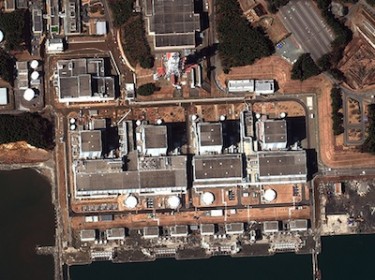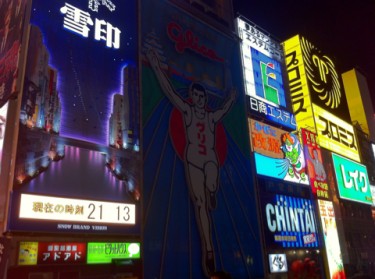This post is part of our special coverage on the Japan Earthquake 2011.
Debates over the risks and benefits of nuclear power plants have sparked worldwide, since an 8.9-magnitude earthquake struck Japan on Friday, 11 March causing widespread fear that the nuclear reactors of at least two power plants near Fukushima may be at risk of melt down. Thousands of citizens in areas at risk of radiation in the North East region are being evacuated in case the very worst should happen. There was an explosion at one plant in Fukushima on Saturday, 12 March.
Throughout the day, Japanese citizens shared their concerns on Twitter. Some urging against alarmist tweeting that could cause panic, and many more venting frustrations over safety risks.
Takuya Kawai (@himanainu_kawai) a teacher and leading social media personality in Japan belongs to the former category:
@himanainu_kawai: 原発では被爆しながら作業してくれている人がいる。そのことに感謝し場違いな原発批判は控えましょう。

Satellite image showing earthquake damage at the Fukushima Dai-Ni nuclear power plant. Image credit: DigitalGlobe www.digitalglobe.com (CC BY-NC-ND 2.0).
Others have questioned the wisdom of developing nuclear energy in such an earthquake-prone country as Japan:
@saltfish_nsk: 電力会社は、地震が原発にとって最悪の事態を引き起こす事は百も承知。そもそも日本は地震国。何故それが必要なのか、事故は原爆と同じ事。お上は過去から何を学んできたのか。
A blogger who describes himself as a pacifist and former officer of Japanese self-defence forces (@BND7) leaves little room for debate:
@BND7: 日本に原発は必要です
A magazine editor and spare time musician says:
@gocci0515: 普段使いたい放題電気使ってるクセに、こういう事態になると「原発原発」ってよく知りもせずに毛嫌いする。じゃあ他のエネルギー源を教えてくれ。自分たちの存在自体が必要悪だって言いながら、事故に遭ってる関係者の気持ちを考えろ!原子力に代わるものがあればいいのにと一番願ってるのは彼らだ。
Who is to blame?
Some critics have placed the blame for the catastrophic situation on the energy demands of large cities such as capital Tokyo.
@mokko0307: 福島とか新潟に原発があるのは東京とかの人のためなんだよね。無駄な電気使わなければ原発必要なかったし今こんなことにもならなかったのに・・・って思うと(´;ω;`) ほんとに電気の無駄遣いとかまじめに考えるべきですね・・・
Anger has been directed by some at a perceived last of interest or concern in the disaster and affected people, particularly in Tokyo. This tweet is from Saturday:
@cobayasu: こと渋谷に関して言えば、オーロラビジョンもいつも通り流れていたし、TSUTAYAも開 いていた。パチンコ屋は土曜日ということもあって混んでいた。福島の原発や、被災者の方々の現実とは無関係のように、渋谷は日常を取り戻そうとしている。 街にTwitter上の一体感や危機感は見えない…
Referring to how few companies had switched off their electric signs on the night of 12 March, @MasaKawaKAKA tweeted:

Japanese company Glico pays respects to quake victims with advert blackout. Image posted by Twitpic user @MasaKawaKAKA.
@MasaKawaKAKA: この中で、状況を理解している企業は「グリコ」だけだ! http://twitpic.com/48r1o9
What to do?
As new problems with the emergency cooling systems of nuclear power plants continue to surface, there are many fearful tweets:
@WindyxLady: あの映像、原発やばいでしょ。風向きは被災地側。最悪の状況か? 海外に原子力に精通する作業のエキスパートの支援が必要なのでは。 国民にも話せないほど深刻な問題なのだろうか?
A web programmer in Fukuoka Prefecture takes a fatalist stance:
@sino1945: まぁ…遠くにいる私が福島原発の詳細を知る必要は、ない。知ったところで、ね。現場の健闘と無事を祈るのみ。
This post is part of our special coverage on the Japan Earthquake 2011.







2 comments